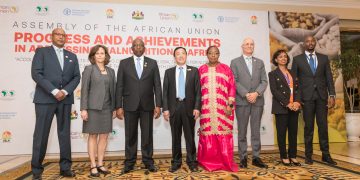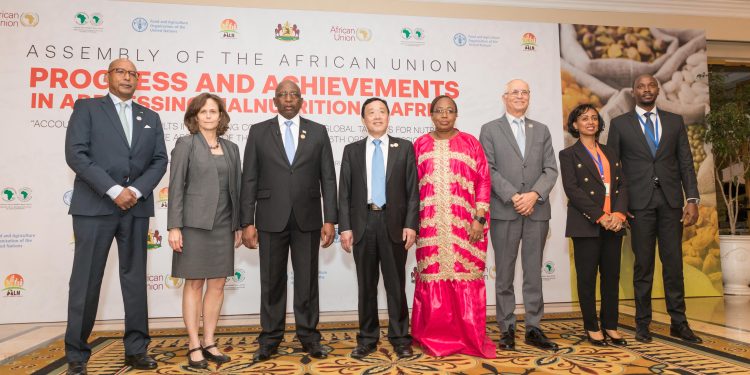ADDIS ABABA, Ethiopia, February 23, 2023/ — Heads of African Union member states have called for more commitment and accountability in Africa’s effort to achieve continental and global goals for nutrition ahead of the 2025 World Health Assembly Nutrition target deadline.
The leaders took part in a nutrition-themed side event during the 36th Ordinary Session of the Assembly of the African Union, co-organized by the Kingdom of Lesotho, the African Union Commission, and the African Development Bank. The meeting was organized under the Bank’s African Leaders for Nutrition initiative and the Food and Agriculture Organization of the United Nations.
The event was held on Friday 17 February, under the chairmanship of Prime Minister of the Kingdom of Lesotho Samuel Ntsokoane Matekane. Its theme: “Progress and Achievements in Addressing Malnutrition in Africa: Accountability for results in achieving continental and global targets for nutrition,” is centred on long-lasting measures to curb malnutrition and food security on the continent.
“It is unacceptable that we stay silent and indifferent at a time when 60% of our continent’s population (799 million people) is affected by moderate or severe food insecurity – making [Africa] the highest level globally. This means one-third of the world’s undernourished, or 282 million people, live in Africa,” Matekane said on behalf of King Letsie III, of the Kingdom of Lesotho.
The King, who is also an African Leader for Nutrition and African Union “Nutrition Champion,” encouraged attendees via a pre-recorded message to meet nutrition goals established by the World Health Assembly and Malabo targets to reduce malnutrition and stunting by the year 2025.
“I have a strong conviction that we can achieve our nutrition targets. If we can accelerate investments and improve the coordination of efforts, Africa will advance nutrition and improve food security outcomes,” he said.
The event served as a wake-up call for African nations to strengthen their political will toward achieving continental nutrition targets, and their willingness to invest in tackling imminent challenges contributing to malnutrition and food insecurity which have intensified across the African Union Member States.
Looking at progress made in addressing malnutrition in Africa, Minata Samate Cessouma, Commissioner for Health Humanitarian Affairs and Social Development at the African Union Commission, presented the progress report based on the Continental Nutrition Accountability Scorecard. The scorecard is a data-based advocacy tool that gives an overview of how African leaders are delivering main nutrition indicators.
Josefa Sacko, African Union Commissioner for Agriculture, Rural Development, Blue Economy, and Sustainable Environment presented a closer examination of progress on the Malabo Declaration and the African Union’s Comprehensive Africa Agricultural Development Programme, or CAADP, commitments.
Côte d’Ivoire’s Vice President Tiemoko Meyliet Koné summarized activities held during the African Union Year of Nutrition 2022 and the Abidjan Declaration, which calls for accelerated investment, implementation, and coordination to improve nutrition and food security in Africa.
“It is now more crucial than ever to support vulnerable communities with multiple and innovative solutions to build their resilience and transform agri-food systems to deliver better nutrition,” said Dr. Qu Dongyu, Director General of the Food and Agriculture Organization of the United Nations, in his remarks.
Representing African Development Bank Group President Akinwumi A. Adesina, Bank Vice President for Agriculture, Human, and Social Development Dr. Beth Dunford told attendees that the Bank’s Multi-Sectoral Action Plan is offering solutions to Africa’s malnutrition challenges. She said the plan is catalyzing nutrition-smart investment across Bank operations resulting in the Bank re-allocating $2.8 billion of its investment in its portfolio to be nutrition-smart.
“I believe that nutrition is a central pillar for Africa’s development,” Dunford said, noting that the plan’s goal is to see a 40% reduction in stunting – a result of chronic under-nutrition – by 2025. “While Bank has made significant progress in the re-allocation of resources…there’s a need to translate these funding re-allocations into stunting reductions on the ground,” she added.
Distributed by APO Group on behalf of African Development Bank Group (AfDB).









